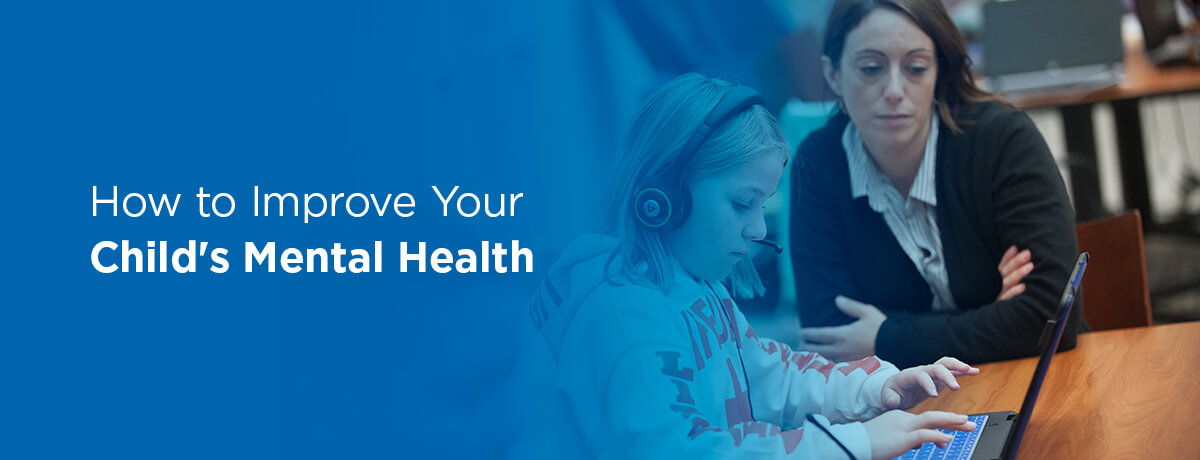Enrollment Now Open for Second Semester. Click Here
Enrollment Now Open for Second Semester. Click Here

Good mental health is crucial for your child because it can better prepare them to cope with life’s stressors, work productively, realize their potential, contribute to their community and build resilience. If your child has good mental health, they’ll likely display qualities such as:
Unfortunately, children don’t often address their mental health issues, which is why it is good to create an open dialogue with them — especially about anxiety and depression, which tend to be the most common mental health issues children face.
Life is full of tough times, but how can you help your child build resistance against these times? Nurturing your child’s mental health is going to be key in building this resistance so your child can learn how to use positive coping mechanisms. It can be quite obvious what children need physically, but what do children need mentally? The definition of good mental health in children is them reaching certain developmental and emotional milestones while learning social skills and positive coping mechanisms.
Because mental health is so essential in living a productive and happy life, let’s explore eight tips to help your child improve their mental health.
It’s an excellent idea for you to encourage your child to express themselves creatively, whether that be through writing, drawing, playing sports, or some other activity. Encouraging your child to play is crucial to their mental health. This is because play helps children reach developmental and emotional milestones. When playing, children learn how to be creative, problem-solve, and control themselves. Children don’t just develop emotionally and mentally during play, but they also develop socially and physically.
Let your child know that feelings aren’t something to be afraid of or to keep bottled up. If your child is upset about something, ensure you spend enough time speaking to them about it so they feel that their feelings are heard. It’s also important to make your child feel validated in their feelings, which you can do by letting them know that their feelings are perfectly normal and that they won’t last forever.
There are a few ways you can nurture your child’s self-esteem and confidence. Make sure you are praising your child regularly for their accomplishments, especially when they are doing activities that are new to them. Smile and talk with your child while they learn a new skill to let them know it’s safe to explore the world and what it has to offer.
If you’re witnessing unsettling behavior that doesn’t quite fit with your child’s character, let them know you’re there to support them through anything. Behavior is often a good indication of what’s going on in a child’s mental landscape, so pay close attention.
When your child comes to you with a problem, make sure you don’t jump to conclusions or get angry, no matter the situation. This way, your child will feel more comfortable coming to you with more serious problems in the future and being honest and open about them.

Your child should feel loved and accepted in your family home no matter what they can or can’t accomplish in life. Let your child know that it’s okay to fail and to be disappointed by that failure but that their worth won’t change on account of it. Ultimately, your child will grow more confident in taking risks and more confident in your love for them. Nurturing your child’s self-esteem and confidence is one way to give your child unconditional love and teach them about self-worth.
It’s also a good idea to practice self-love in the view of your child. Avoid self-deprecation when in their presence, and make sure you take care of yourself both mentally and physically while expressing your unconditional love for yourself.
Being a parent to your child requires having a loving relationship with them that has a basis in understanding and patience. If your child feels that you understand who they are on a deeper level and are patient even when you struggle to understand, you will likely have a closer relationship with them.
You can foster a close relationship with your child by planning activities that the whole family enjoys, like going to a museum for the day or going camping for the weekend.
Be consistent with your standards regarding your child’s behavior. Don’t get mad at them for a certain behavior only part of the time. Also avoid anger, nagging or threats as punishment. Instead, let your child know that they’ve done something wrong, why it was wrong, and what the consequences will be.
When it comes to setting boundaries for your child, be realistic and kind with your expectations. Also, show your child that you have the same expectations for yourself. For example, if you want your child to put their plate in the dishwasher after dinner, make sure to do it yourself as well.
If you’re honest with your child, they’re more likely to be honest with you. If you set realistic goals for your child, their confidence and self-esteem will soar. This is because they will feel good when reaching appropriate milestones and avoid consistent failure. Ensure you’re honest with your child about their goals and how easily they can be reached. Children need to know that a final goal may take a lot of time for them to achieve and that they may make mistakes along the way.
When you’re being honest with your child, avoid being sarcastic. For example, if your child fails a difficult test, it’s best to discuss their feelings on what happened rather than taking a sarcastic or blaming approach to the issue. Your child will then begin to understand that their feelings are heard and valid no matter the situation. This will help them to feel more comfortable in all areas of life that involve self-expression.
It’s okay for children to act out at times. However, poor mental health makes life more challenging to navigate.
Your child may not explicitly let you know when they’re struggling with their health and well-being, but there are signs you can look out for that will let you know your child is not coping with life’s stressors:
If your child starts to exhibit these red flag actions or their behaviors are interfering with other aspects of their lives, like school or social interactions, seek help from a professional. A behavioral specialist can help address the issue before it gets even worse.
It’s also important to remember not to blame yourself as a parent. Everyone develops at their own pace, and sometimes, children need a little extra help in certain areas.
Here at Commonwealth Charter Academy, we aim to provide the support your child needs to be successful, which is why our school counselors are trained to provide life skills and support to all of our students.
If you want to know more about us and what we can do for your child, request information online or give us a call at 855-409-3853.
Enrollment Now Open for Second Semester. Click Here